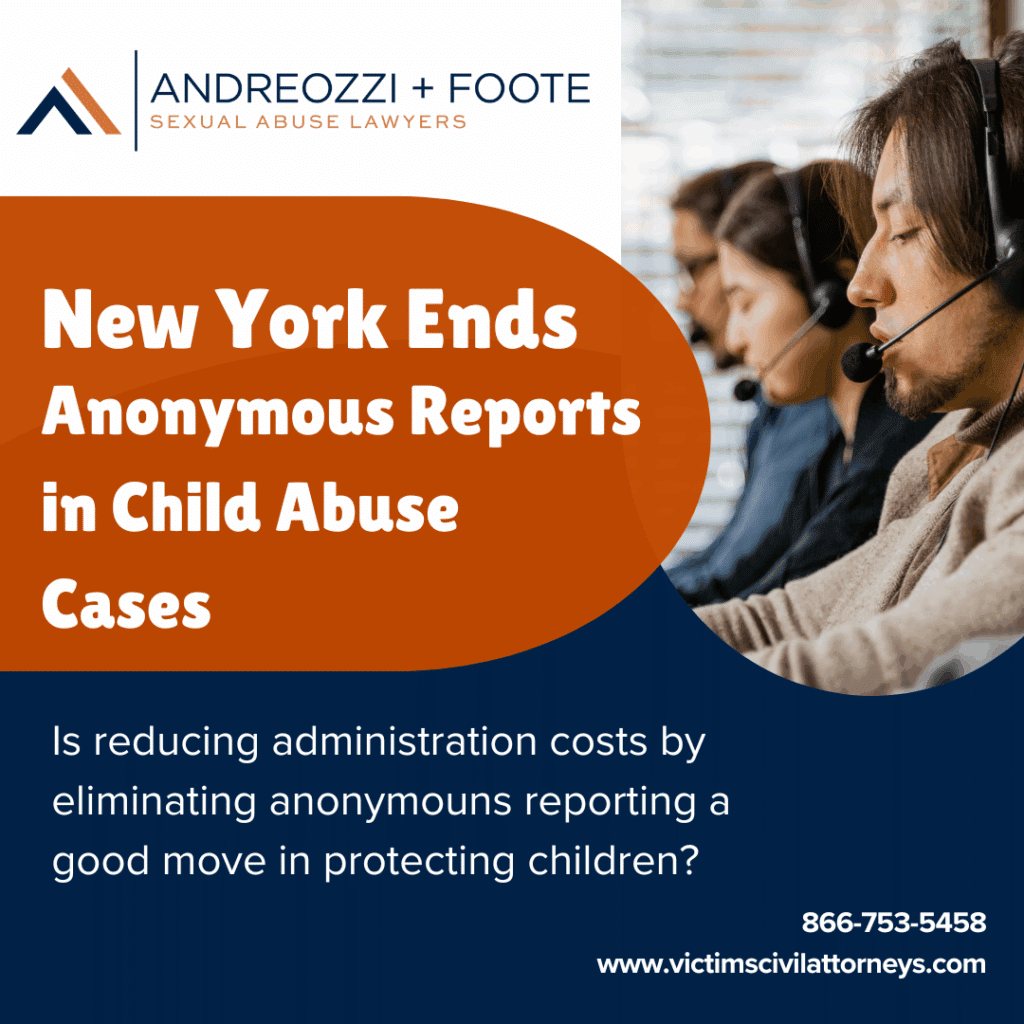New York has passed legislation that will end anonymous reports to the Statewide Central Register of Child Abuse and Maltreatment. It will move to Gov. Hochul’s desk for signature. But is this a step forward for the protection of children, or a roadblock that could lead to a decrease in reports.
Anonymous reporting is a necessary tool allowing anyone to make a report of suspected child abuse. Why does this matter?
Of the child sexual abuse cases reported to law enforcement, 93% of victims knew the perpetrator.
- 34% were family members.
- 59% were acquaintances.
It’s scary and upsetting when one suspects child sexual abuse, especially when they know the alleged perpetrator. Being able to make a report and remain anonymous is a serious safety tool.
Eliminating New York Anonymous Reporting Takes Away Vital Protections
- No more anonymous reports. Callers to the child abuse hotline must now provide their name and contact info, or the tip won’t trigger an investigation.
- The law instead makes reporting confidential, not anonymous the caller’s identity won’t be disclosed to the family or go public.
- A new supervisor-screening step ensures that callers unwilling to share their name receive options for support services and are warned that knowingly false reports are illegal.
Why This Legislation Was Introduced
1. Alleged Abuse of the System
Until now, anonymous reports even unsubstantiated ones have triggered invasive investigations.
- In NYC alone, 4,000+ children per year were subject to CPS investigations based solely on anonymous complaints; over 90% were unsubstantiated.
2. Preventing Targeted Harassment
Abusive partners, exes, or even landlords have weaponized anonymous tips to harass families especially BIPOC households.
- Under current rules, a landlord or angry ex can repeatedly trigger intrusive and traumatic CPS investigations
- The law is backed by public defenders, NYSBA, and groups like The Bronx Defenders and Children’s Rights
But National Statics Say Something Different
- Every year, approximately 3.6 million calls are made to child abuse hotlines nationwide roughly 9,000 calls per day.
- Of these, about 85% are either screened out or unsubstantiated. But that does not mean they were false or malicious.
Rate of False or Unsubstantiated Reports
- False reports, meaning claims proven intentionally untrue, are relatively rare most studies show around 2–10% of cases.
- A federal review found that 92% of children investigated were subjected to allegations later deemed “unfounded” or “screened out”.
- In one detailed study of sexual abuse reports, only 2.5% were deemed incorrect, and just 1.5% were intentionally false.
Concerns About False Reporting Are Often Overblown
- Most unsubstantiated calls don’t reflect abuse they often reflect systemic issues like poverty, stress, or misplaced concern.
- Policies that limit anonymous calls could deter people from reporting concerns especially in communities where fear of retaliation or bias is real.
- Reforms should focus on targeting genuinely false or malicious reports, not on shutting down all anonymous or confidential calling pathways.
Does Confidential Really Mean Protected
- Yes. In almost every case, your name stays confidential.
- When New York ends anonymous reporting, that means the state will ask for your name and contact info. But it does not mean the person you’re reporting will be told who you are.
- The law still keeps your identity confidential under Social Services Law § 422.
However, as sexual abuse attorneys we know there are always exceptions.
If someone files a lawsuit claiming a false or malicious report, and a judge believes knowing your identity is necessary for the case to move forward, a court could order your name to be disclosed but only under very strict circumstances.
Even then, the identity is often shared under seal or with legal safeguards in place.
In Rodriguez v. Doe, a civil rights case, a court allowed disclosure of an anonymous reporter’s name but only after evidence showed repeated, malicious reports with no factual basis.
Courts will weigh the privacy rights of the reporter against the accused’s right to a fair trial. Unless there’s clear evidence of bad faith, confidentiality usually wins
Bottom line: If you’re making a report in good faith to protect a child, your identity will almost always remain protected. The law is designed to hold abusers accountable not silence those trying to do the right thing.
Is this a Good Change?
No-one wants our systems to be abused or have resources used to investigate false claims. However, we need to always air on the side of protection when it comes to children. Friends and neighbors are going to be less likely to report abuse now that they must share their names. Even thought they will most likely never be revealed, the very fact that your name exists on records that you reported is enough of a deterrent.
At Andreozzi + Foote we believe any and all steps to protect children must be deployed, even if it costs more, the end result means less child sexual abuse. Because that cost is one no child or family should ever bear. Our trauma-informed sexual abuse attorneys are at the ready to fight for your rights and protections.
Call us 24/7 with any questions and concerns. 1-866-753-5458.



